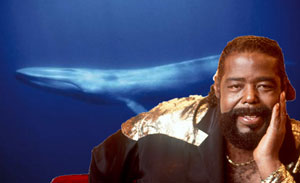 Like Italian crooners and Latin lovers, male blue whales serenade potential mates with song. Scientists have been recording these songs since the early 1960s, first in the Atlantic, then branching out to listening stations around the globe. A few years ago they reached a startling conclusion: year by year, the voices of blue whales were getting deeper and deeper.
Like Italian crooners and Latin lovers, male blue whales serenade potential mates with song. Scientists have been recording these songs since the early 1960s, first in the Atlantic, then branching out to listening stations around the globe. A few years ago they reached a startling conclusion: year by year, the voices of blue whales were getting deeper and deeper.
“It’s a fascinating finding,” said John Calombokidis, a blue whale expert at the Cascadia Research Collective. “It’s even more remarkable, given that the songs themselves differ in different oceans. There seem to be these distinct populations, yet they’re all showing this common shift.” Blue Whale Song Mystery Baffles Scientists, Wired Science, December 2, 2009.
The question, of course, is why? One theory being tested is that by lowering their voices, blue whale crooners make themselves appear larger than they really are. And, as everyone knows, female blue whales like their men… plus-sized.
Not surprisingly, this same phenomenon has been observed in human courtship rituals. In scientific studies at major universities, the honey-smooth basso profundo voice of Barry White singing “Can’t Get Enough of Your Love, Babe” was guaranteed to send female test subjects into passion-induced seizures, whereas the chalk-board screeching of Barry Manilow‘s “Copa Cabana” would send them fleeing for the exits. It is a well-known fact that among humans, the deeper the voice, the bigger the swoon factor.
To test this theory on whales, cetacean researchers played Barry White’s “It’s Ecstasy When You Lay Down Next to Me” through hydrophones in the northern Pacific for 48 hours straight. While the music was playing, at least a dozen female blue whales made amorous advances on a 200-ton Scripps Institution research vessel.
Next, scientists piped Barry Manilow’s “I Write the Songs” into the water. Within hours, 5 whales had beached themselves and others were showing signs of acute distress, prompting an emergency decision to terminate the experiment. “It was just too cruel to continue,” said a tearful Scripps Institution spokeswoman. “I consider myself a professional, but even I was about to throw myself overboard to end the pain. If they had brought up ‘Mandy’ on the playlist, there would have been blood in the waters.”
Juvenile blue whales along the Pacific rim have recently been heard beatboxing, causing researchers to wonder if a dramatic cultural shift is underway in the deep oceans. “Like teenagers everywhere, juvenile blue whales seem to be rejecting the staid conventionality of their parents’ songs in favor of the avant-garde music of the streets,” suggests Dr. Lynn Esposito of Duke University’s Marine Labs. “If whale musical styles continue to evolve at this pace, I expect we’ll soon see a clash between the blue whale hip hop vanguard and the establishment classical purists. The kids will win out in the end, of course. Except in a few, small, traditionalist enclaves in the north Atlantic, those old whale standards will gradually fade away, signaling a sad end to a great musical era for the blue whale.”


You could not make this stuff up!